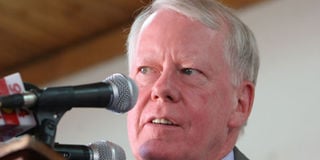Kenyans should stay on reform path

US Ambassador to Kenya Michael Rannebeger. Photo/FILE
When I first spoke to the American Chamber of Commerce in Kenya just over two years ago, I discussed the profound partnership between the United States and Kenya.
That partnership – and friendship – has deepened over the past two years, and this was no where more evident than during the watershed crisis Kenya experienced earlier this year.
The current agenda for fundamental reform – both political and economic – poses a historic opportunity and challenge for the people and government of Kenya.
Kenyans today are within grasp of a much brighter democratic future, one which will improve the well-being of all the people of this country.
You may think this a problematic statement to make, given the watershed crisis that Kenya experienced early this year.
But let us pause to reflect upon what happened then and where matters stand today. As a great friend and partner of Kenya, the US worked with the Kenyan people to play a decisive role in resolving the crisis.
The US was only able to play this role because the Kenyan civil society, religious groups, the private sector, the media, and ordinary citizens mobilised themselves.
As a result, an unprecedented coalition government was established on the basis of an agreement to pursue fundamental reforms necessary to ensure the country never again suffers such a fate.
Arguably, the process of implementing the reform agenda has been slow, but we must put this criticism into perspective.
The President and Prime Minister are managing a very complex political situation, and the reform agenda raises a host of sensitive issues that must be carefully navigated.
Some progress
We are, in fact, seeing progress. Critical legislation, including on the Truth, Justice, and Reconciliation Commission, Ethnic Relations, and Constitutional Review Bills, have been passed by Parliament.
The President and Prime Minister are moving towards formation of the Special Tribunal called for in the Waki Commission report.
In order to ensure the reform agenda is implemented in a transparent and effective manner, the coalition government and the Parliament should reach out to the Kenyan people through civil society to take into account their observations.
Doing so will help ensure there are no loopholes or hidden agendas in the relevant legislation, particularly with respect to the Special Tribunal and establishment of an independent electoral body.
These – coupled with constitutional revision – are by far the most important elements of the reform agenda. The reform agenda, and even the results, are not, in themselves, a panacea for the problems that Kenya faces.
The reforms – if fully carried out – will put in place constitutional provisions, laws, and mechanisms to deal with four major issues – lack of accountability, the culture of impunity, ethnic tensions, and lack of land reform – which have plagued Kenya for over four decades.
We must be realistic in appreciating that it will likely take decades and generations to change the underlying attitudes that help fuel such problems.
In this process the Members of Parliament will be tested to demonstrate whether in fact they represent a force for constructive change.
Will Parliamentarians be more responsive to the people – leading reform efforts, genuinely hearing constituent concerns, passing relevant legislation that is in the interest of all Kenyans, and paying a fair amount of tax – or will they instead become enmeshed in the old ways of doing business?
While progress is being made, it is important to note what has not yet been accomplished. There has been no sign of movement for a serious overhaul of the police.
Some of the bills passed by Parliament have not yet been signed into law while judicial and prosecutorial reforms need to be addressed.
In order to build a more positive future, Kenyans have no choice: the reform agenda must become history in the making.
Given what this country experienced less than a year ago, and given the devastating consequences of such a difficult period, Kenya’s start toward economic and political recovery is nothing short of extraordinary.
But serious questions must be asked. Will Kenya’s political class truly heed the lessons of January and February?
Will Kenya’s private sector, religious communities, and civil society leaders maintain the drive and momentum of earlier this year that will ensure the reforms which are so necessary are enacted?
Will the media play the same kind of responsible role that it played during the crisis, or will it instead focus on sensational journalism focused on a glass half-full perspective?
Will we be able to say in 2012 that those who led Kenya from the despair of 2008 implemented the changes needed to ensure that nothing like that could ever happen again?
I am also a realist, someone who recognizes that, while calls for reform are often enthusiastically voiced, meaningful and lasting reform can only come about through concerted and sustained action.
At risk
Kenya’s economy will continue to be at risk until the political framework for sustained and robust growth is firmly in place.
The United States is encouraged by business and government leaders in Kenya who have demonstrated a commitment to dialogue and action.
I commend the Prime Minister for initiating the business roundtable. It is a start to developing the consensus needed to create the most open and prosperous economy possible.
Mr Ranneberger is the US Ambassador to Kenya.




